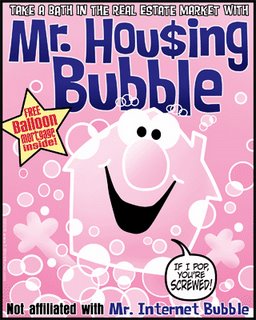
I read this morning that Freddie Mac (Ferderal Mortage Giant - which has been under federal investigation a few times in the last couple of years for unfair market domination, etc.,) is going to introduce a 50 YEAR MORTGAGE TERM program. That follows a widely available 40 year, and a few investors that offer a 45 year term. Interest-Only and Option-Arm mortgages were "invented" in the last few years by Investors (those who buy loans as securities on Wall Street) who needed to get creative in the development of new loan products that would bouy up their production (read: stock price) after the refi boom ended about 24 months ago. They are meant to allow buyers to qualify for more home for the money by qualifying, debt-to-income wise, by subtracting the "principle" portion of the payment from a traditional PITI (principle, interest, taxes, insurance) calculation.
For example, a traditional PITI mortgage might carry a payment of $1500, while borrowing the same amount of money (ie buying the same house) using an IO option would yield a payment of only $1150, effectively getting somebody into the same house for less money. The downside here, obviously, is that you are not gaining any equity through your payments. Setting appreciation aside for this case, two years from now, or five or ten, depending on how long that IO period is, you would owe the same amount of money on the loan as when you originally signed the loan documents.
With an Option Arm, the risks are magnified by an exponential amount. An option arm allows you to make payments, if you wish, that do not even cover the interest amount on the loan you signed, and that short amount is tacked onto the back of your loan as more principle. That means that when the initial period is over, you could potentially owe MUCH MORE in principle on the loan you originally signed. (and more than your home is WORTH - making it very hard to get out from underneath - if you sold your house, you would have to bring money to the closing table to get out of the house.)
For wise and disciplined borrowers, wisdom would dictate that the extra money one would save from that type of mortgage would be better spent going into one's IRA or other form of long-term savings, and you should NEVER just make that minimum payment, putting principle amount on the end of your loan, except in very dire circumstances. This is a great loan for people in certain circumstances, but it has become a vehicle for buyers who would not otherwise qualify for a given home on their income. Not good. Here is what is happening: From a recent CNBC article:
Nearly one in 10 households with a mortgage had zero or negative equity in their homes as of September 2005, according to First American Real Estate Solutions, an arm of title-insurance company First American Corp. The study of 26 million homes in 36 states and the District of Columbia found that one in 20 home borrowers was upside-down by 10% or more.
The situation is even grimmer for recent borrowers. Of those who bought or refinanced homes in 2005, 29% had zero or negative equity, and 15.2% were underwater by 10% or more.
Interest rates on about a quarter of all mortgage loans outstanding, or $2 trillion, are scheduled to reset this year and next, according to Economy.com. Homeowners who opted for extremely low teaser rates in recent years could see their payments eventually double, said Christopher Cagan, First American's director of research and analytics.
Defaults and foreclosures are already on the rise, thanks in part to higher interest rates, cooling real-estate markets and overextended borrowers. Nationally, 117,259 properties entered some stage of foreclosure in February, according to foreclosure-monitoring firm RealtyTrac, a figure that's up 68% from February 2005.
1 comment:
This drives me absolutely nuts. A friend that runs a mortgage business that does most of its lending to people within three miles of my home told me that 37% of the loans they did in the last 12 months were interest-only and option-ARM loans. He thinks it's crazy.
I saw how the ARM thing worked in the neighborhood where I bought my first home in the late 80s. I bought after interest rates plummeted from incredible highs. The whole subdivision was starter homes. Most were 3-5 years old when we bought. Many of my neighbors got in when the rates were very high. Many did the ARM thing with the idea that: a) rates would come down and they could refi, b) personal income would go up, or c) both a and b.
Well, rates did go down, but not everyone's personal income went up. To top it off, some folks couldn't refinance due to bad credit (being behind on their mortgage after payments ballooned). So, a number of people were stuck. Every block of every street had at least one foreclosed house. It was nasty. Many people's credit was permanently ruined. But the homes made great deals for people like me.
My mortgager friend tells me that most of the interest-only and ARM loans his place has done in the last 12 months were for more than $220,000. That's a far cry from the starter home area I once lived. What are these people thinking? It's like having a lease, but much more dangerous.
Post a Comment